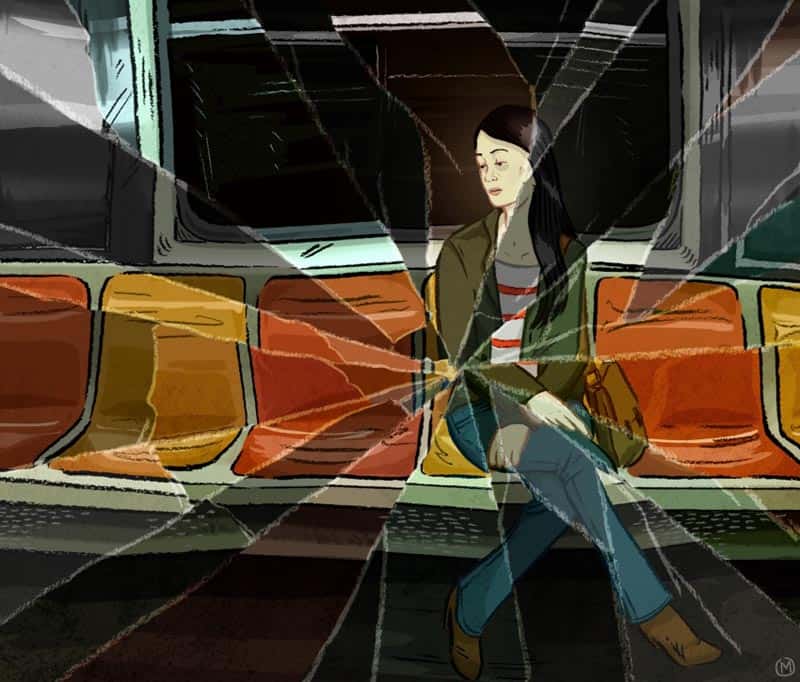Two years ago I had a lot of sex. I enjoyed a healthy and hearty sex life and had a very sex positive attitude. I had a lot of love, more than enough to go around, and I had all kinds of sex. I had love-making sex, I had passionate sex that left clothes strewn around an apartment, I had angry sex, I had lazy friend sex, I even had sad sex with exes. I had my hair pulled, my ass slapped, and my wrists tied to bed posts. All of this was done willingly and happily with men that I was dating, friends, or lovers.
One night I drunkenly went home with a man who I’d known for some time, a man who wasn’t a stranger. Everything went the usual way. There were beers drank, music played, the sitting on the bed, and the awkward moments before the first kiss, then the hungry removal of clothing, the interruption of the condom retrieval, and the giggling. But somewhere, something shifted. The sex to which I had consented started to morph into sex to which I had not consented.
All the sex I’ve had, drunken or otherwise, has been something that was done mutually, something done together, something shared, an exchange, a mutual desire for the other to find pleasure. Having had so much healthy sex in my life I can identify and qualify the difference. The sex I had on the night in question was not something done together, it was not an exchange. It was something that was done to me. It was an act of domination over another. It was a dehumanizing act where one person’s pleasure was derived from the other person’s degradation and lack of control. I’d heard it said before that rape isn’t about sex, it’s about power, but I always thought, “Well, isn’t it just a little bit about sex?” Unfortunately it took the experience of being raped for me to fully understand that statement. It’s simple. I was having sex with him already, so it wasn’t about him wanting sex; it was about him getting off on dehumanizing me.
I am plagued by societal voices that I have internalized over the years. I blame myself for being drunk. I blame myself for being so casual and promiscuous with my sexuality. I examine what I wore. I try to recall the actions or words that indicated to my rapist that I deserved or wanted to be raped.
Yet, these are not my voices. These are someone else’s voices. These are things I’ve heard. Impressions I’ve gotten. This is what society thinks about victims of rape. They are the voices that point out how drunk a victim was. They are the voices that still think that if you wear provocative clothing you are asking for it. They are the voices that call a women’s healthy sexuality slutty and who say a slut gets what’s coming to them. These are voices that associate rape as being the result of unbridled sexual desire and the victim of rape as a victim of warranted sexual objectification. They are overwhelmingly loud – so loud that they drowned me, an intelligent left leaning feminist, out. These voices gnawed at me. Actually, gnawed is too light a word. Devoured. Consumed. Swallowed me up.
I have spent nearly two years barely alive. Since the moment it happened it was as though someone pushed the pause button on my life. There has not been a single day since that I have not thought about what happened. I fluctuate between being angry, bone sad, and numb. I feel a deep sense of shame and self-blame that prohibits me from moving forward.
We need to shift how we talk about rape. If we keep employing the language around rape that implies it has anything to do with sex then we are saying that the victims of rape not only had a violent and violating assault upon their body, but that they somehow warranted that objectification, be it by being drunk, what they wore, or how they acted. We need to talk about rape for what it actually is. Rape isn’t about a veracious sexual appetite needing to be filled and a powerlessness to control animal urges. Rape is about power. Rape is about control. Rape is humiliation and degradation. Rape is not about sex.
If we can talk about rape for what it truly is, a horrendous and devastating violent crime, then maybe we can finally start looking at the perpetrators as the ones to blame. If we keep talking about rape as being the result of sexual objectification then we keep perpetuating victim blaming language, which in turn leaves victims of rape in a shroud of shame and self-blame. And take it from me, it’s no way to live. In fact, it’s barely living.



 Follow Us On Instagram
Follow Us On Instagram
